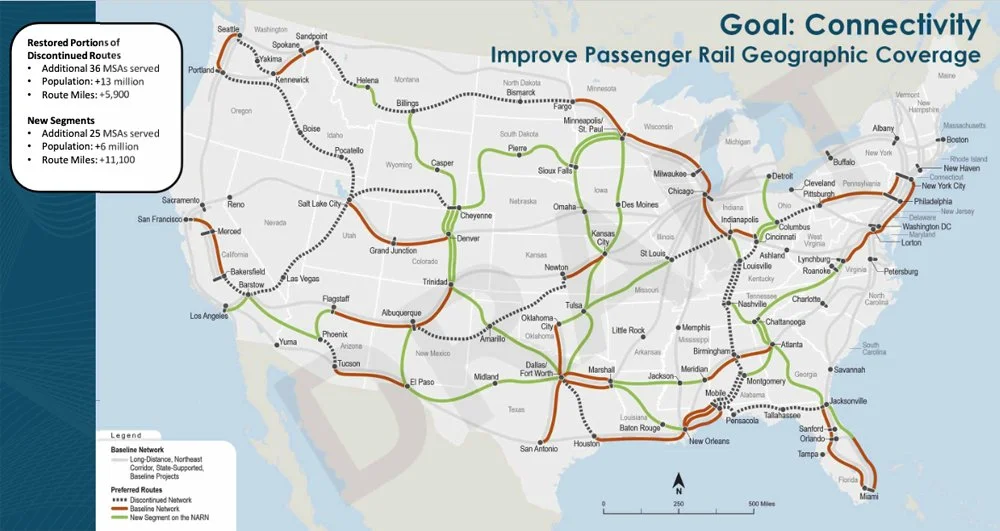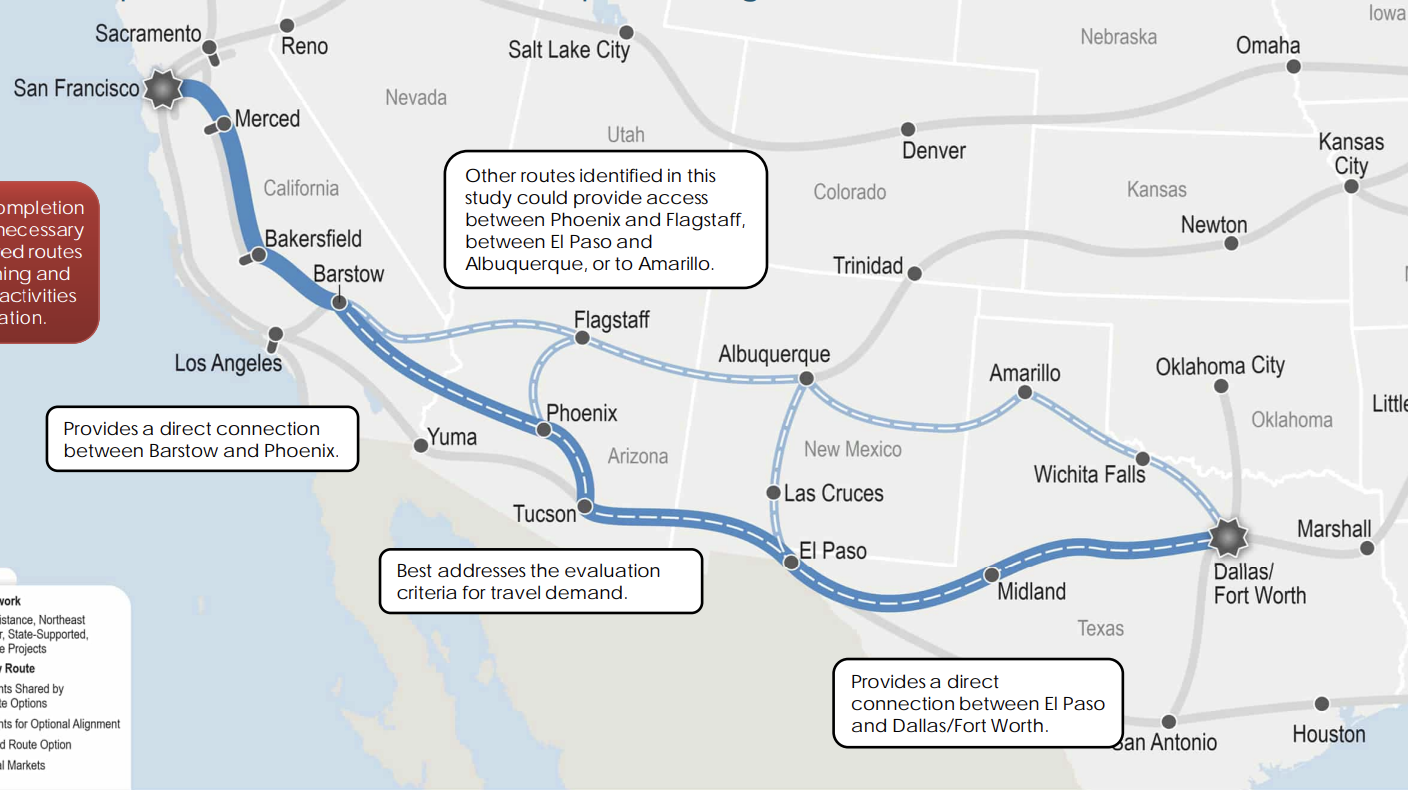FRA’s Long-Distance Route Proposals
Current Long-Distance Routes (Feb 2024)
FRA’s Proposed Routes (as of Feb 2024)
Figuring The Routes
In another example of the US federal government’s drive for better passenger rail access; fifteen new long-distance route proposals have been announced. This time the Federal Railroad Administration (FRA) is at the helm. Meetings with the FRA, Amtrak, and state officials have concluded a rational pursuit for putting the long routes in service; some of which haven’t been active in the better part of 80 years. During these recent meetings, the FRA presented a 163-page powerpoint to the other parties, which includes the expansion of service
Amtrak Southwest Chief
According to the FRA’s designated for the federal project (https://fralongdistancerailstudy.org), “Section 22214 of the 2021 Bipartisan Infrastructure Law tasks the FRA, under the delegation from the Secretary of Transportation, with conducting an 'Amtrak Daily Long-Distance Service Study’ to study the restoration of daily intercity passenger rail services and potential all-new long-distance routes.” Generally, the FRA is setting out with some criteria within the evaluation of these routes. The administration will only propose an expansion in service for…
Any Amtrak long-distance routes that were discontinued
Any Amtrak long-distance routes that occur on a non-daily basis
However, totally new routes may be suggested and funded for with the collaboration of Amtrak. Criteria involved for the building of brand new routes include;
Link and serve large and small communities as part of a regional rail network
Advance the economic and social well-being of rural areas of the US
Provide enhanced connectivity for the natural long-distance passenger rail system
Reflect public engagement and local and regional support for the restored passenger rail service
Keep in mind, the definition of “brand new” by the FRA is any passenger rail routes in service as of 1971, but not continued when Amtrak was created on May 1st, 1971. Even with these parameters put in place the long-distance route amalgamations are plenty.
The Proposed Long-Distance Routes
Below I analyze and list out the new long-distance routes proposed, as well as the historical context of each proposed route;
Chicago-Miami ~ via Indianapolis, IN > Louisville, KY > Bowling Green, KY > Nashville, TN > Chattanooga, TN > Atlanta, GA > Macon, GA > Waycross, GA > Jacksonville, FL > Orlando, FL
Possible Connected Services:
Chicago-Milwaukee-Green Bay, WI
Atlanta/Macon, GA-Augusta/Savannah, GA
Jacksonville-Daytona Beach, FL-Miami
Population: 6.96 million
Existing Decommissioned Track: 15%
Ridership: 151,000 estimated annual passengers
Route Last Served in 1979 on Amtrak’s Floridian
Dallas/Ft. Worth-Miami ~ via Marshall, TX > Shreveport, LA > Baton Rouge, LA > New Orleans > Mobile, AL > Pensacola, FL > Tallahassee FL > Jacksonville, FL > Daytona Beach, FL
Possible Connected Services
Shreveport, LA-Jackson, MS-Meridian, MS
New Orleans-Meridian, MS-Birmingham, AL
Jacksonville, FL-Orlando, FL-Miami
Population: 1.30 million
Existing Decommissioned Track: 41%
Ridership: 139,000 estimated annual passengers
Route Last Served in 1995 on Amtrak’s Sunset Limited
Denver-Houston ~ via Colorado Springs, CO > Trinidad, CO > Amarillo, TX > Wichita Falls, TX > Dallas/Ft. Worth, TX > Bryan, TX
Possible Connected Services
Dallas/Ft. Worth-San Antonio-Houston
Population: 0.27 million
Existing Decommissioned Track: 24%
Ridership: 39,000 estimated annual passengers
LA-Denver ~ via Barstow, CA > Las Vegas > Salt Lake City > Ogden, UT > Rock Springs, WY > Cheyanne, WY
Possible Connected Services
LA-Yuma, AZ-Phoenix
Denver-Colorado Springs, CO-Trinidad, CO
Salt Lake City-Denver
Population: 0.51 million
Existing Decommissioned Track: 85%
Ridership: 64,000 estimated annual passengers
Route Last Served in 1997 on Amtrak’s Desert Wind
Phoenix-Minneapolis ~ via Flagstaff, AZ > Albuquerque, NM > Amarillo, TX > Wichita, KS > Newton, KS > Kansas City > Omaha, NE > Sioux Falls, SD
Population: 0.98 million
Existing Decommissioned Track: 33%
Ridership: 28,000 estimated annual passengers
Dallas-NYC ~ via Oklahoma City > Tulsa, OK > Springfield, MO > St. Louis > Terre Haute, IN > Indianapolis > Cincinnati, OH > Dayton, OH > Columbus, OH > Pittsburgh, PA > Philadelphia
Possible Connected Services
Columbus, OH-Cleveland-Pittsburgh
Dallas-Tulsa, OK
Oklahoma City-Wichita, KS-Newton, KS-Kansas City-St. Louis
Population: 4.70 milllion
Existing Decommissioned Track: 23%
Ridership: 85,000 estimated annual passengers
Route Last Served in 1979 on Amtrak’s National Limited
Houston-NYC ~ via New Orleans > Mobile, AL > Montgomery, AL > Atlanta > Chattanooga, TN Knoxville, TN > Roanoke, VA > Lynchburg, VA > Washington DC > Philadelphia
Possible Connected Services
Mobile, AL-Birmingham, AL
Montgomery, AL-Birmingham, AL
Atlanta, GA-Birmingham, AL
Roanoke, VA-Ashland, WV-Cincinnatti, OH
Population: 4.03 million
Existing Decommissioned Track: 19%
Ridership: 125,000 estimated annual passengers
Route Last Served in 1971 on L&N’s Pan American
Seattle-Denver ~ via Portland, OR > Boise, ID > Pocatello, ID > Ogden, UT > Salt Lake City > Grand Junction, CO
Possible Connected Services
Seattle-Spokane/Yakima, WA-Sandpoint, ID
Portland, OR-Kennewick, WA-Yakima/Spokane, WA
Denver-Cheyanne, WY-Casper/Gillette, WY-Billings, MT-Butte/Helena, MT-Sandpoint, ID
Population: 1.28 million
Existing Decommissioned Track: 46%
Ridership: 59,000 estimated annual passengers
Route Last Served in 1997 on Amtrak’s Pioneer
San Antonio-Minneapolis ~ via Dallas > Tulsa, OK > Kansas City > Des Moines, IA
Possible Connected Services
Dallas-OKC-Newton, KS-Kansas City
Minneapolis-Duluth, MN
Dallas-Houston
Population: 1.73 million
Existing Decommissioned Track: 13%
Ridership: 52,000 estimated annual passengers
Route Last Served in 1971 on Texas & Pacific’s Texas Eagle
San Francisco-Dallas ~ via Merced, CA > Bakersfield, CA > Barstow, CA > Phoenix > Tucson, AZ > El Paso, TX > Midland, TX
Possible Connected Services
Barstow, CA-Flagstaff, AZ-Albuquerque, NM-Amarillo, TX-Wichita Falls, TX
El Paso-Las Cruces, NM-Albuquerque, NM
Phoenix-Flagstaff, AZ
Population: 0.96 million
Existing Decommissioned Track: 11%
Ridership: 52,000 estimated annual passengers
Detroit-New Orleans ~ via Toledo, OH > Columbus, OH > Cincinnati, OH > Louisville, KY > Bowling Green, KY > Nashville, TN > Birmingham, AL > Montgomery, AL > Mobile, AL
Population: 6.68 million
Existing Decommissioned Track: 80%
Ridership: 81,000 estimated annual passengers
Route Last Served in 1971 on L&N’s Pan American
Denver-Minneapolis ~ via Cheyanne, WY > Rapid City, SD > Pierre, SD > Sioux Falls, SD
Population: 0.77 million
Existing Decommissioned Track: 9%
Ridership: 41,000 estimated annual passengers
Route Last Served in 1997 on Amtrak’s Pioneer
Seattle-Chicago ~ via Yakima, WA > Kennewick, WA > Spokane, WA > Sandpoint, ID > Missoula, MT > Helena, MT > Billings, MT > Bismarck, ND > Fargo, ND > Minneapolis > Milwaukee
Possible Connected Services
Seattle-Spokane, WA
Helena, MT-Butte, MT-Billings, MT
Population: 0.40 million
Existing Decommissioned Track: 61%
Ridership: 10,000 estimated annual passengers
Route Last Served in 1979 on Amtrak’s North Coast Hiawatha
Dallas-Atlanta ~ via Marshall, TX > Shreveport, LA > Jackson, MS > Meridian, MS > Birmingham, AL
Population: 0.36 million
Existing Decommissioned Track: 0%
Ridership: 59,000 estimated annual passengers
Route Last Served in 1969 on Texas & Pacific’s Texas Eagle
El Paso-Billings ~ via Albuquerque, NM > Trinidad, CO > Denver > Cheyanne, WY > Casper, WY
Possible Connected Services
Casper, WY-Gillette, WY
Population: 0.36 million
Existing Decommissioned Track: 2%
Ridership: 46,000 estimated annual passengers
Route Last Served in 1969 on Burlington’s North Coast Limited
**For ridership context, the cross-country California Zephyr service from Chicago to San Francisco had 328,458 passengers in 2022.**
The Long-Distance Difference
According to the FRA presentation if all proposed routes were implemented into the current US system the benefits would include; an additional 61 US metros, 45 million people would have access to long-distance passenger rail. Overall, 23,200 additional track miles would make up the system. Therein an increase of 61 metros, an added 74% of tribal lands, 86% of all US medical centers, 91% of all US higher education institutions, and 43% of rural communities would all see new access to passenger rail services. In general, two additional states and 24 additional congressional districts are slated to have access to passenger rail if the new proposals take action. Additionally, 102 stations in small communities (93% increase) and 114 stations in large communities (53% increase) will be added to the system. With six million more people having access to the service. A 43% increase.
These proposals come separately from Amtrak’s Corridor ID project with Amtrak providing a supporting role to the FRA in planning. Funding for the evaluation of the routes comes from the Infrastructure Investment and Jobs Act of 2021. With this procurement of the slotted $500,000 for research the plan is to both expand service and bring new service to long-distance routes specifically. A good portion of this increased service bring expansion westward. Most notably, there is one overlap the two in the form of reviving the North Coast Hiawatha on its former ex-Northern Pacific route; west of Fargo, North Dakota via the state of Montana into the Yakima, Washington region ending to Seattle. In my opinion, one of the most beautiful long-distance routes taken away last century. To see it proposed to be brought back is a W in my book and it would be a dream to see it back in service.
Later this year (2024), the FRA and Amtrak will finish up their evaluation meetings in collaboration with the many communities, partners, and stakeholders invested and involved in the grand plan. At which point, hopefully on-site development will commence. As of writing (February 2024), evaluation phase is still underway. Therefore, for those who are interested; feedback is still being reviewed and can still be left on the project’s website at; https://fralongdistancerailstudy.org.
Thank you for reading!




















